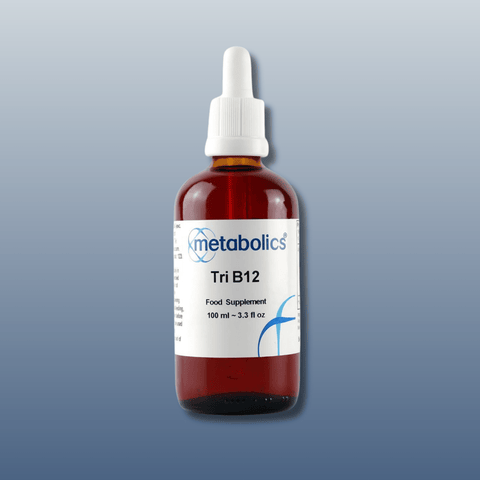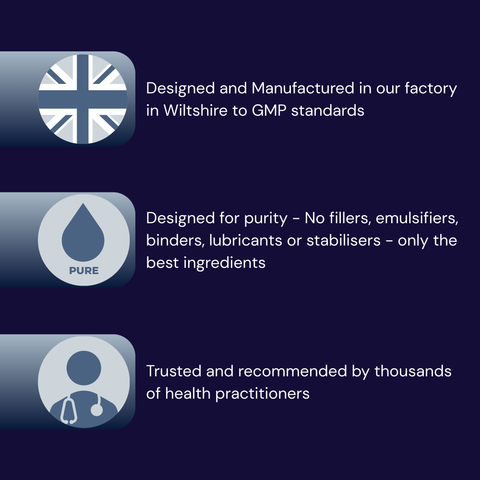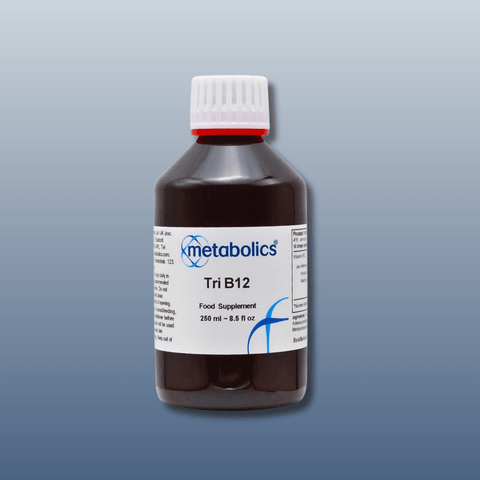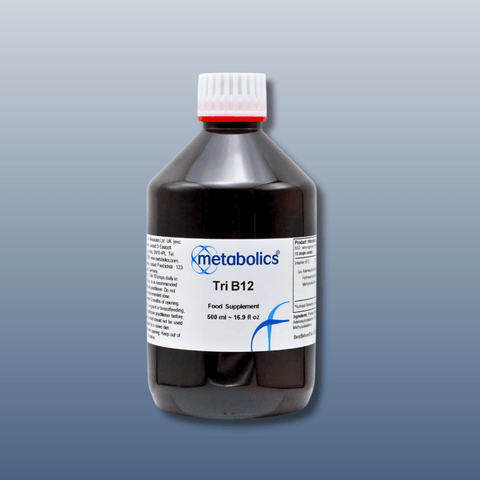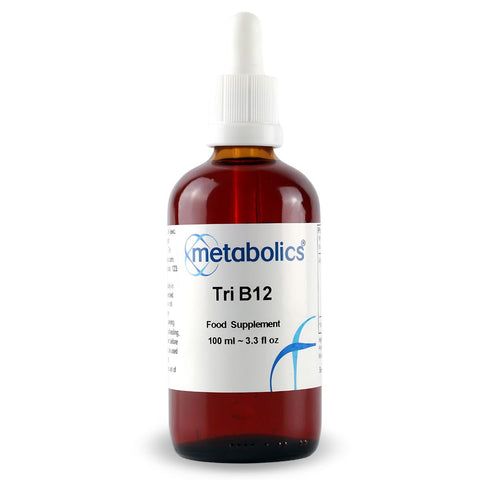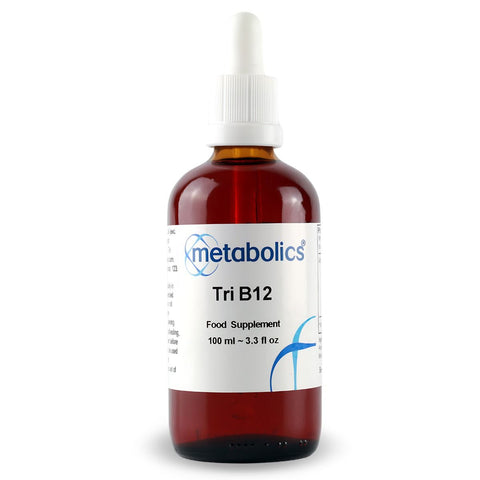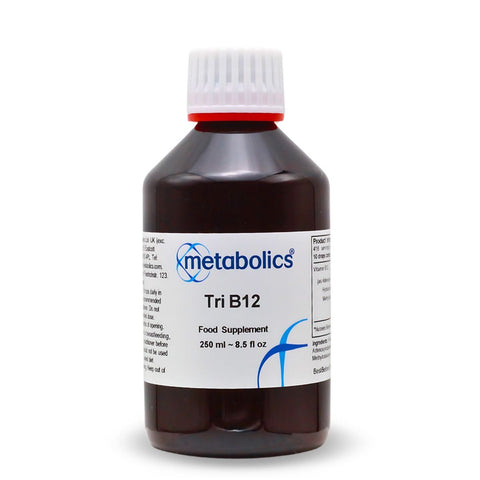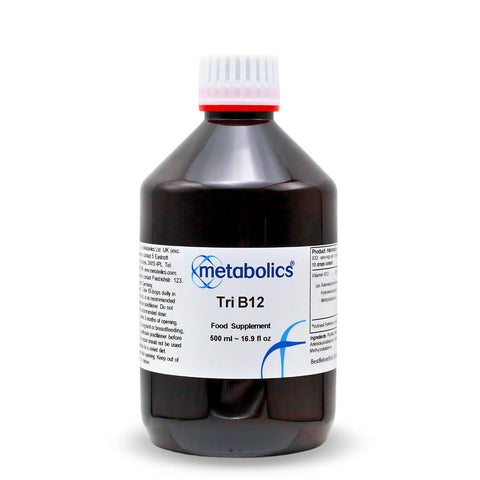Suitable For
What is Metabolics Tri B12 liquid?
Metabolics Tri B12 liquid combines an equal blend of the three forms of vitamin B12; methylcobalamin, adenosylcobalamin, and hydroxocobalamin. Methylcobalamin and adenosylcobalamin are coenzyme forms and are readily utilised by the body for quick action, hydroxocobalamin, on the other hand, is used more slowly by the body and offers continuous support due to a longer half-life compared to other forms, allowing for gradual release and utilisation.
We have formulated Metabolics Tri B12 liquid using raw materials released against established monographs. We have independently chemically tested all three forms of B12 to confirm their identity and then manufactured our Metabolics Tri B12 liquid using highly purified water produced using reverse osmosis (RO) technology. This means that customers can rest assured that they know exactly what is in their supplement without any unnecessary ingredients interfering with the active components.
What is Metabolics Tri B12 liquid for?
Tri B12 liquid is a food supplement that contains an equal blend of the three forms of vitamin B12; methylcobalamin, adenosylcobalamin, and hydroxocobalamin. Vitamin B12 offers various benefits and is commonly used to support overall health.
Vitamin B12 contributes to normal energy yielding metabolism, playing a role in the body's ability to convert food into energy. Specifically, it is involved in the metabolism of carbohydrates, fats, and proteins, which are the main sources of energy for the body. By participating in these metabolic processes, B12 helps ensure that the body has a steady supply of energy to support various physiological functions and activities.
Vitamin B12 can contribute to the reduction of tiredness and fatigue. According to the EFSA’s vitamin B12 review, “Haematological effects of vitamin B12 deficiency include amongst others a gradual onset of the common symptoms of anaemia, such as diminished energy and exercise tolerance, fatigue, shortness of breath and palpitations”. A hallmark symptom, therefore, of vitamin B12 deficiency is that you may feel tired or weak.
Vitamin B12 contributes to normal functioning of the nervous system. It is involved in supporting the health and proper functioning of the nerves throughout the body and is essential for the production of myelin, a protective sheath that surrounds and insulates nerves, facilitating efficient transmission of nerve impulses. Adequate intake of B12 ensures the integrity and optimal performance of the nervous system, which is vital for various neurological processes, including cognitive and memory support, and muscle coordination.
Vitamin B12 contributes to normal homocysteine metabolism; homocysteine is an amino acid produced in the body as a byproduct of methionine metabolism. Elevated levels of homocysteine in the blood are associated with increased risk of cardiovascular diseases. B12, along with other B vitamins such as folate and vitamin B6, plays a crucial role in converting homocysteine into other substances, thereby helping to maintain its levels within a healthy range.
Vitamin B12 contributes to normal psychological function and adequate intake of B12 is associated with supporting mental well-being and cognitive health. B12 is involved in various processes in the brain, including the synthesis of neurotransmitters and the maintenance of nerve cells. Therefore, ensuring sufficient levels of B12 can help support overall psychological function, including mood, memory, and concentration.
Vitamin B12 contributes to normal red blood cell formation; it plays a crucial role in the production of red blood cells, which are responsible for carrying oxygen throughout the body. Adequate intake of B12 ensures that the body can produce a sufficient number of healthy red blood cells, which is essential for overall health and well-being.
Vitamin B12 contributes to the normal function of the immune system; supporting the body's immune response and helping to defend against infections and illnesses.
Vitamin B12 has a role in the process of cell division and is involved in the formation of new cells, a fundamental process for growth, development, and repair throughout the body. Ensuring sufficient B12 intake is important to support optimal cell division and overall cellular health.
Who is Metabolics Tri B12 liquid for?
By incorporating different forms of B12 into a supplement, individuals can benefit from a comprehensive approach that addresses various aspects of B12 metabolism and utilisation. This can be especially beneficial for those with specific health concerns, genetic predispositions, or dietary restrictions that may affect B12 absorption and utilisation.
For most people, all B12 forms may have similar bio availabilities and effects. Individuals with specific single nucleotide polymorphisms (SNPs) impacting B12 absorption may benefit more from certain forms of Vitamin B12. However, since these SNPs are not typically included in commercial tests, individuals may need to experiment with different B12 forms sequentially or opt for a supplement containing a combination of all three naturally occurring forms of B12 for potentially faster clinical improvements.
Why use Metabolics Tri B12 liquid
Taking a B12 supplement such as Metabolics Tri B12 liquid can be advantageous over relying solely on food sources due to the complexities of B12 absorption in the body. Here's why:
Digestive Challenges: B12 occurs naturally in foods bound within a protein matrix. During digestion, it needs to be released from this matrix to become available for absorption. However, the process of liberation from food matrices and subsequent absorption depends on factors like adequate chewing and levels of stomach acid and proteolytic enzymes. In some individuals, digestive issues or conditions may impair this process, reducing the absorption of B12 from food sources.
Transport Mechanism: Once liberated from the food matrix, B12 binds to a protein called haptocorrin (HC), also known as the R factor. HC carries B12 along the gastrointestinal tract. However, for B12 to be absorbed, it must be liberated from HC. This requires the action of proteolytic enzymes.
Absorption Routes: Liberated B12 can be absorbed via two distinct routes: (1) binding to the intrinsic factor (IF) protein or (2) being taken into the gastrointestinal mucosa by diffusion. IF facilitates B12 absorption through the endocytosis route in the ileum, a part of the small intestine. However, the capacity of IF is limited, with saturation occurring at approximately 2 μg of B12 per meal. Conditions that affect the production or function of IF, such as autoimmune pernicious anemia or atrophic gastritis, can significantly impair B12 absorption.
Digestive Disorders: Individuals with certain digestive disorders like coeliac disease, ulcerative colitis, or Crohn’s disease, may experience compromised intestinal absorptive function, further hindering B12 absorption.
Considering these factors, taking a B12 supplement can provide a more reliable and efficient way to ensure adequate B12 intake, especially for individuals with digestive issues or conditions that affect B12 absorption. Supplements offer a concentrated and readily absorbable form of B12, bypassing potential absorption challenges associated with food sources.
The NRV of vitamin B12 for adults is set at 2.5μg/day in the UK. 10% to 30% of adults older than 50 years often have B12 malabsorption syndromes, driving absorption rates as low as 1% of the ingested B12. Thus, those adults would need to ingest 240 μg of B12 to absorb at least 2.4 μg.
Each ten-drop serving of Metabolics Tri B12 liquid delivers 300 μg of vitamin B12 (as 100ug of adenosylcobalamin, 100ug methylcobalamin & 100ug hydroxocobalamin), providing ample flexibility for dosing according to individual needs and preferences.
Excess vitamin B12 from supplements is typically excreted by the body through urine. Unlike some other vitamins, B12 is water-soluble, meaning that any excess amounts that are not used by the body are generally flushed out through the kidneys.
This product is suitable for vegetarian and vegan diets.
Please note the following warnings:
If you are pregnant, breastfeeding, have a healthcare condition or are taking medication consult with a healthcare practitioner before using.
Directions: Take ten drops diluted in water with food
Food supplements made to GMP standards.
Made in our clean room facility, here in the UK.
ISO accredited ISO:9001 and ISO:14001 accredited.
Supplement Facts
10 drops contain
%NRV*
Vitamin B12
300μg
12000%
(as adenosylcobalamin 100μg
methylcobalamin 100μg
hydroxocobalamin 100μg)
† Nutrient Reference Value (NRV*) not established
Ingredients
Directions / Dosage
 Liquid
Liquid
Warning
Storage
Product Type


